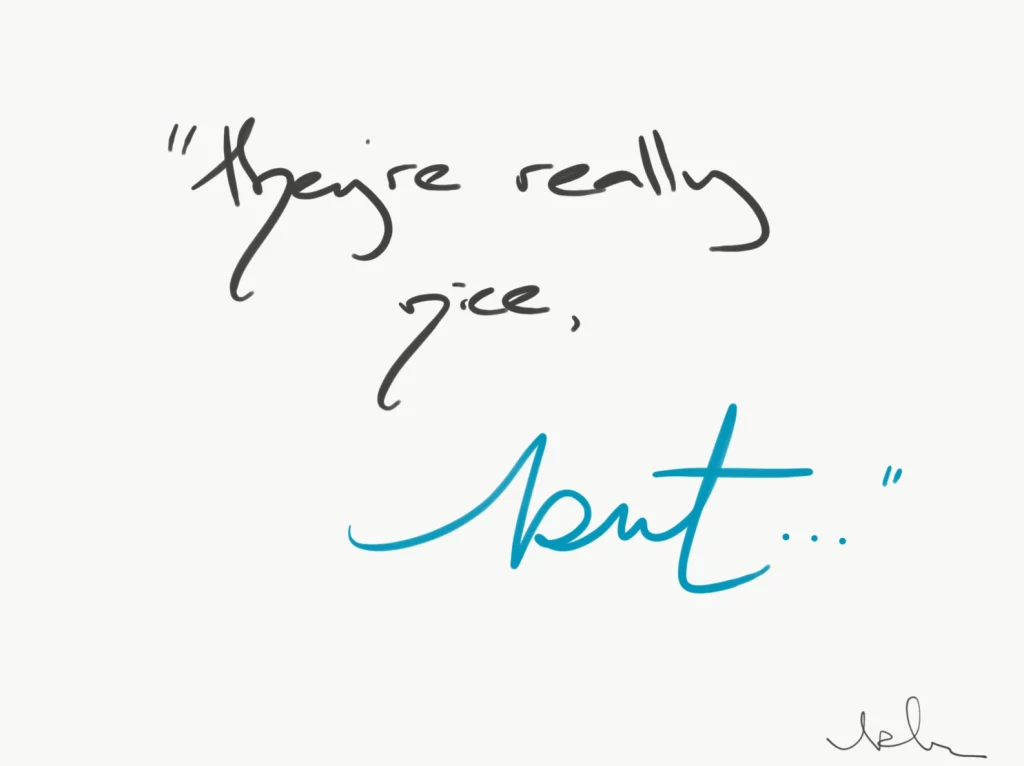When you hear yourself (or someone else) say this phrase, it’s actually all over.
The supplier. The company you hired. The employee. The strategic partner. The accountant. The client. The advisor. The minister. The author. The influencer. The lecturer. The date. The….whoever.
I have heard this phrase used by so many people for so long, that when I hear it now, it’s like a red warning flag, waving wildly.
Because what comes after this statement is the real problem, the truth, the thing being covered over.
“He’s a really nice guy, but….the accounts are always late.”
“She’s a really lovely person, but….she doesn’t actually have the experience I thought she did when we hired her.”
“They’re a really nice company, but…I don’t really understand what we’re paying for.”
“There are really nice people there, but…that church has messed up a lot of people.”
“He’s a really nice person, but…he questions every bill we send, and doesn’t follow our advice.”
When you say “they’re a really nice person”, what you mean is:
- I feel badly for this person
- I think it’s my fault because I chose to hire/work with them/build a relationship
- They haven’t yelled or swore at me or raised their voice
- Whenever I bring up the problem (which I have, many times), they promise to fix it and they really do try
- Sometimes they are okay (they’re not consistent) and then i have hope again
- I know there are Things going on in their life and I’d feel terrible if I cancelled/let them go/stopped going there
- We have history and they were there for me in a tough time in the past
- They smile or text me or send cards or do other nice things
- I’m not sure they know better
- It would be hard for me to tell them how i actually feel and what’s really bothering me
- The relationship would change if I told them how frustrated I am. They might not even be my friend or talk to me ever again
None of these – not one single one of these – is a valid reason for allowing a relationship to continue.
Not.
One.
These aren’t actual reasons to keep working with someone (or employing them or staying in relationship with them).
These are your fears.
These are your lack of boundaries.
These are you trying to take someone else’s responsibility on your own shoulders.
These are you trying to take on the responsibility of the entire world, and make everything okay.
These are avoidance techniques.
These are also a reflection of YOU being a really lovely person, too.
It is good you’re the kind of person who doesn’t want to see someone lose their job. Lose their home. You don’t want to see someone hurt, or sad, or angry.
But you cannot make or keep everyone happy all the time.
You can’t even do it some of the time.
You can’t even do it for your own self.
Things which make us sad, or angry, or horrified, or hurt, are part of our process in growing. Learning. Listening. Taking responsibility. Being willing to change.
“There is a big difference between hurt and harm. We all hurt sometimes in facing hard truths, but it makes us grow. It can be the source of huge growth. That is not harmful. Harm is when you damage someone. Facing reality is usually not a damaging experience, although it can hurt.” – Dr Henry Cloud, Boundaries
The fact this person or company or organisation is “nice” or “lovely” is neither here nor there. A lot of people are nice. Actually, most of us are nice by cultural conditioning and expectation.
Someone bumps into you at the post office queue. You mutter a little, maybe say “hey, careful!”, but (unless you have significant anger issues which require some deep therapy) you don’t push them or start wrestling them to the ground right there in the post office. You stay nice. You play nice. And then you go home and complain to anyone who will listen about the very not-nice person you had to deal with that day.
You smile weakly at the person who makes what they think is a really funny statement or asks what they see to be as a funny question….but you actually find it quite hurtful or wearying. You stay nice, because it’s not worth it to get into an entire conversation about what they don’t understand.
You ignore the selfish facebook post, the side-comment.
You stay nice.
You play nice.
In these kind of examples, with strangers, being nice is a good thing. It means you’ve weighed it up and you’ve decided the relationship isn’t there. The effort isn’t worth it. They won’t listen and it will only cause more pain, and it is the better part of valour to walk away or close the phone or close your mouth.
But when there IS an actual relationship, and what is happening affects your life or your business or your family or your spirit….
…being nice is not kind.
It is kind to tell a poorly performing employee that they are not achieving the goals set or living up to the company values.
It is kind to share your frustrations with a supplier and talk through what’s not working for you.
It is kind to tell the applicant that this is not the company for them.
It is kind to explain to your client how things work at your firm, and what will happen if they don’t honour that.
It’s kind because you actually, genuinely care. You want this person, this company, this organisation to change. If they are willing. And that’s as far as you can take it: because their response is not your responsibility.
Their response
is not
your responsibility.
Being ‘nice’ doesn’t tell you anything about who someone truly is. I know personally some people I considered to be very, very nice….who are also very twisted and messed up and have caused a lot of hurt and damage. In a case like that, “niceness” (on their part) is hiding something.
And if that person affects us or we have a relationship with them of any kind, “being nice” on our part usually means we too are hiding something. We’re avoiding something.
If you know this person will get really angry, or upset, or throw a tantrum, or pull back from relationship, because you had a real honest conversation with them….
…that means it’s even more urgent to do it now.
Because it will not get better. They will not become more open and more willing and more emotionally healthy. It will only get worse. They will only continue further on the road they’re on.
“When we begin to set boundaries with people we love, a really hard thing happens: they hurt. They may feel a hole where you used to plug up their aloneness, their disorganisation, or their financial irresponsibility. Whatever it is, they will feel a loss. If you love them, this will be difficult for you to watch. But, when you are dealing with someone who is hurting, remember that your boundaries are both necessary for you and helpful for them. If you have been enabling them to be irresponsible, your limit setting may nudge them toward responsibility.” – Dr Henry Cloud, Boundaries
It may be this person is (in addition to being nice), also really kind and a beautiful soul and with good skills.
They’re just not the person for YOUR company or the best person for that particular role.
It may be that company is (in addition to being nice) really good at what they do. But they’re not YOUR people, your tribe. You don’t talk the same language, you’re not their ideal client, you and they would both be better off and quite happy if you went elsewhere.
Sometimes people are nice, and they’re evil. Sometimes people are nice, and they’re in the wrong space. Sometimes people are nice, and with work and good conversation and therapy they will change.
But none of this will be fixed by you repeating to yourself, “but they’re such a lovely person”.
So when you hear yourself saying “They’re a really lovely person, but…”
Listen to the “but” at the end.
It will tell you what’s really going on, and what really needs to be addressed.
Now, address it.
You can do so gently. In person or on a video call. With a long conversation. Acknowledging your own failures and areas of responsibility, but not ignoring theirs. Listening. Asking good questions. Caring. Being kind. Being loving.
You may even hear yourself saying, “You’re a really lovely person, but this isn’t working out.”
Or, “you’re a really lovely person, but this is not okay.”
Or “you have a really lovely company, but I’m frustrated.”
And at last you’ve gotten to the real root of the issue, and can work to solve it.
With kindness. Not niceness.



